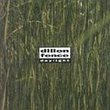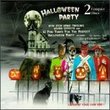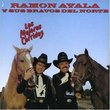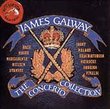| All Artists: Brahms, Horowitz, Toscanini, NBC Title: Piano Concerto 2 Members Wishing: 0 Total Copies: 0 Label: RCA Release Date: 4/5/1991 Genre: Classical Styles: Forms & Genres, Concertos, Short Forms, Historical Periods, Modern, 20th, & 21st Century Number of Discs: 1 SwapaCD Credits: 1 UPC: 090266052325 |
Search - Brahms, Horowitz, Toscanini :: Piano Concerto 2
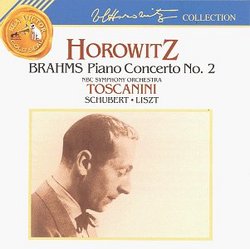 | Brahms, Horowitz, Toscanini Piano Concerto 2 Genre: Classical
|
Larger Image |
CD DetailsSimilar CDs
|
CD ReviewsHorowitz Submits to Toscanini's Iron Will Hank Drake | Cleveland, OH United States | 03/23/2000 (4 out of 5 stars) "This recording of the Brahms Second Concerto, made in 1940, was the first collaboration between Vladimir Horowitz and his father-in-law, Arturo Toscanini. Great conductor that he was, Toscanini left something to be desired as an accompanist--it was always Toscanini's way, or no way at all. Horowitz basically marches along to Toscanini's beat, allowing himself some welcome freedom in the piano solos (the second subject solo is especially well phrased.) It must be said that few soloists play the notes as honestly in this Concerto as Horowitz does here (there is no covering up with the pedal or dropping of notes, ala Rubinstein). But technical qualities alone do not make a successful performance. The sonics are good for 1940 (the recording was made in Carnegie Hall, instead of the notoriously cramped Studio 8-H), the piano and orchestra are well balanced. However, there is a far superior recording from these collaborators, made off the air from a live concert in 1948, with a marginally more assertive Horowitz and much better sound, circulating on a several labels. The Brahms Intermezzo is from a live concert. The performance could best be described a Schumannesque, but the sound is airless. The Schubert Impromptu was recorded in 1953, but not released until many years later. Horowitz became displeased with the performance when he realized he was playing from a musicologically corrupt edition of the score. His 1962 Sony recording and 1987 live Vienna performance--on video only--are to be preferred here. The Liszt pieces are the high point on this album. Although Au bord d'une Source is poorly transferred, the performance is as bracing as a mountain stream. The Sonetto is easily superior pianistically to his 1986 DG recording. Horowitz's own arrangement of Liszt's warhorse Hungarian Rhapsody #2 has to be heard to believed. During the cadenza, he plays all three themes at once! Horowitz later commented that this was the most difficult transcription he ever made, but he makes is sound easy." Horowitz Triumphant; Composers' Personalities Submerged Hank Drake | 10/18/1998 (4 out of 5 stars) "The mannered, hyper-dramatic, intense style of Vladimir Horowitz sometimes submerges the personality of Brahms and the other composers in this compilation of famous old Victor recordings from the forties and fifties.The Piano Concerto No. 2 in Bb was recorded in Carnegie Hall in 1940, with the NBC Symphony under Toscanini, the pianist's father-in-law. The pianist is said to have protested at one time of his married life, before Toscanini's death, "My father-in-law drives me crazy"; he also claimed that Bruno Walter (not Toscanini) was his favorite accompanying conductor! The Walter-led concert performances of the Brahms concerti with Horowitz tend to confirm this: in both the d-minor and B-flat, the pianist is more relaxed and expressive than in the NBC broadcasts and recordings with the Italian maestro. The piano sound is very tinny, thin, and over-brilliant, but the well-recorded orchestra has depth and body of tone. The high frequencies of the original 78-rpm source recording are somewhat rolled off for modern tastes, but the transfer has been done well. This is by no means anywhere near my favorite list of performances of the work (Rubinstein/Reiner, Fleisher/Szell, Curzon/Szell, Katchen/Monteux, Pollini/Boehm, and many others are WAY ahead of this famous old Victor recording, in my estimation!)The short pieces were recorded over a wide span of years: the more successful performances are the Liszt works. All were taken down in the period before stereo technology."
|

 Track Listings (9) - Disc #1
Track Listings (9) - Disc #1